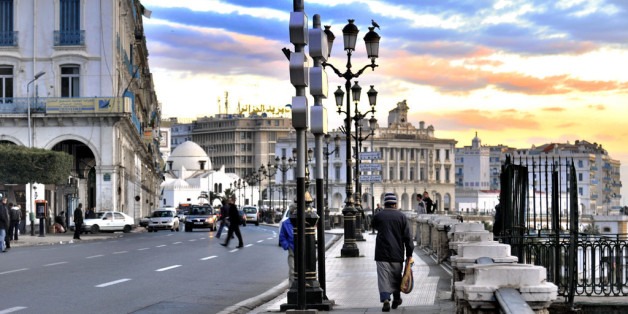Algiers has been home to plenty of demonstrations this year. In Algeria’s capital and beyond, political and underlying economic forces have not escaped the international community. Pictures and videos beamed around the world have shown demonstrators and police often standing side-by-side to oppose the government and its former President Abdelaziz Bouteflika.
Bouteflika, who led the country for two decades, bowed to pressure not to stand again. Yet for the hundreds of thousands who protested, the demands extend beyond Bouteflika to ensuring that the entirety of the political class step aside, free elections ensue and most pertinent of all, that the economic and social aspirations of the country are met.
Algeria has clearly learnt from the bloodshed of the Algerian Civil War and Arab Spring - the ruling FLN party rejected executive calls to quell protests and 1000 judges refused to oversee elections should protesters be quashed. Restraint has gone a long way, but for how much longer?
Things since April have largely gone unnoticed as international focus shifted toward developments in the Middle East, Sudan, and Europe. An election scheduled for July 4 was cancelled without reason by the Constitutional Council in early June - Algeria’s political leaders have lost much of what credibility they had left.
As the impasse deepens, the prospect of outright unrest (especially if the military gets involved) or a unity government composed of the FLN and opposition parties seems a natural step before elections. Perhaps the installation of Prime Minister Noureddine Bedoui, an independent, as transition leader is a required bridge to move forward in way that works for both sides. Because as Adam Nessiter of the New York Times discussed in early June ‘Algeria’s political opposition is divided and disputatious, with no single party or personality having emerged to lead the protest movement.’
This moment in Algeria’s history, whilst uncertain, represents an exciting crossroad towards renewed leadership and a more open economy with greater sector development, joint ventures and international expansion. Both those in power and those in waiting, a path forward needs to be found; the economy, trade, and more openness could be those building blocks.
Economic Opportunity
True, it is easy in the current circumstance to overlook the economic successes of the recent past: 20% reduction in poverty, median GDP growth of 3.1% (2010-2017), and debt to GDP a very modest 38.8%, improving rates of education as well as the shared highest life expectancy in Africa (77). The present leadership does deserve some credit from the opposition and international community alike, but change seems inevitable so why wait.
Because for when you look deeper, Algeria is more than just an emerging market. Africa’s largest country by geographic area – rich in resources – is the largest Arab nation in the world, and home to 42.5m people, 52% of whom are under 30. Yet youth unemployment of 1 in 4 is clearly too high and opportunities for young people too few, so all the hallmarks are there for better greater prosperity.
On closer inspection one can see economic and commercial opportunities – high population density (10,000 per sq. km) offering concentrated economic activity around coastal cities; internet penetration of 42% gives room for expansion; an oversized oil & gas sector (95% of export revenue) alongside an economy dominated by state owned industries and firms sow the seeds for greater diversification.
Reducing dependency on imports in favour of domestic production and joint ventures - a policy of the existing government - could well continue under the next administration – whatever its competition - because success stories like Hyundai’s investments, or Nissan’s recent $16om joint venture with Hasnaoui are taking place. Algeria’s position is clear: you can sell into our market, you must produce those products in our country whilst working with us as partners. That has, however, caused inflation as reassembled goods cost more domestically, than if imported.
Elsewhere, tourism is heavily underdeveloped comparative to both regional and international standards with better regulations, tourist infrastructure, and promotion all needed – time to visit the Casbah.
Pharmaceuticals also represent an opening for FDI as much of the market is dominated by majority state-owned Groupe Saidal, a success story that operates elsewhere in Africa so other firms would create a vital economic and health ecosystem. Banking, too, owing to non-performing loans and state-owned nature of the banks, could do with foreign competition for lending to SMEs, new services, and operating models.
Huge shipping and port capacity and relative geographical position offers new opportunities for trade into Africa and onward to Europe. Interestingly, it is often forgotten that so much of Algeria’s trade is done with so few countries - predominately on a regional basis (EU) or with energy exports to China – that can only improve.
Foreign direct investment has also lagged markedly behind other MENA countries, which needs to change if jobs are to be created through construction, new services, and business models. Equally, if Algeria really wants knowledge transfer in order to develop sectors and human capital, then investment promotion and the PR that comes with it will be need a significant revamp.
Ultimately, investors and business partners should be positive about Algeria future as a place to invest and do business – it’s a developed economy in emerging market clothing. Meanwhile Algerians can be confident that further diversification, increasing trade and FDI will ensure growth that facilitates good jobs and wealth.
For a country in deep transition, colliding economic desire interacting with political structures has brought Algeria to this point in its history. The ruling needs to see things in a different way. Not as a loss of power, but as a change in direction that unlocks fresh ideas and approaches for a more prosperous future for Algeria as a nation. Yes, that will see new people in power but a shared vision and common ground would be good for all.
Algeria's future will be bright, the current situation is a transition towards that end.
By Robert Quartly-Janeiro


